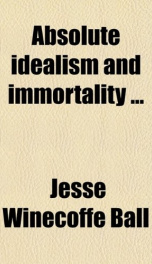absolute idealism and immortality

Purchase of this book includes free trial access to www.million-books.com where you can read more than a million books for free. This is an OCR edition with typos. Excerpt from book: and complete individual, in whom all others have their being, the Absolute. All things have their source and goal in Him. f. The discussion of the idealistic analysis of the human individual culminates, then, in the Absolute Being. The measure of reality in finite individuals is the degree in which the Absolute finds expression in them as the differentiations of its fundamental unity. Our human lives present aspects of the divine life. In a more profound sense even than St. Paul had in mind the absolute idealist maintains, "It is God that worketh in you." The relation which the finite individual sustains to the Absolute is therefore seen to be one of great interest and importance for the deeper issues of our subject. Difficulties Of The Teleological Conception Of Mind. The Mind As Relative. I. The finite individual and the Absolute. Royce's definition of the individual. The self defined in terms of meaning and purpose of the Absolute. How the element of uniqueness is concerved. The Absolute as a self, all inclusive. In crticism, the element of uniqueness not sufficiently safeguarded by Royce; the truth that "in God we live and move and have our being" does not necessarily involve identity of thought and will; this full identity endangers ethical distinctions that are fundamental; Royce's failure to provide an adequate ground in the individual for the will and purpose whose uniqueness is essential to his theory; the individual an existent, greater than his thoughts and purposes or the sum of them, related to the absolute by inclusion not identity; man's will therefore free even to oppose the Eternal, however ineffectually. So also Ormond. II. The apparent instability of the organic unity of mind. Questions raised by facts of multiple personality or dissociation; s...
Info about the book
Author:
Series:
Unknown
ISBN:
1148859160
Rating:
4/5 (3)Your rating:
0/5
Languge:
English
Users who have this book
Users who want this book
What readers are saying
What do you think? Write your own comment on this book!
write a commentGenre
if you like absolute idealism and immortality try:
Other books by this author
Do you want to read a book that interests you? It’s EASY!
Create an account and send a request for reading to other users on the Webpage of the book!


